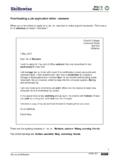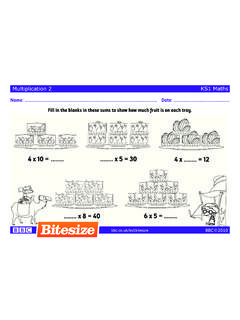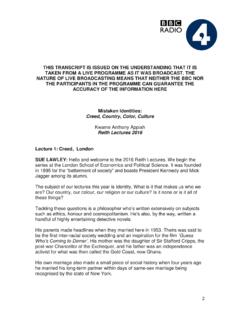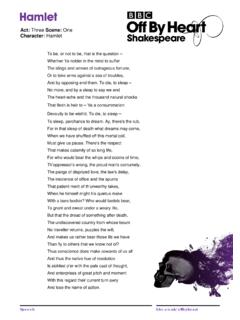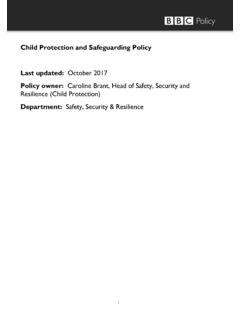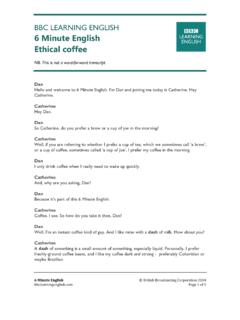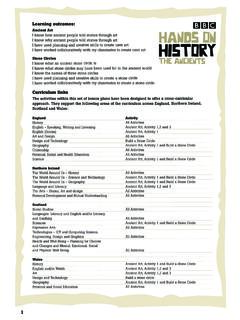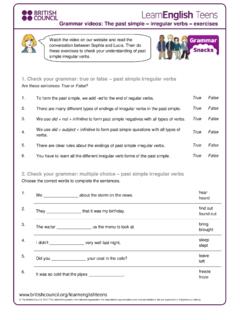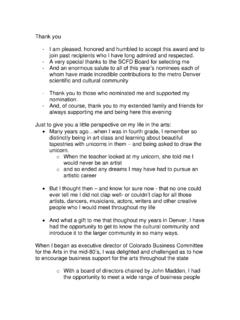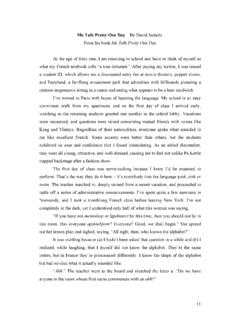Transcription of OUR PAST THROUGH FILM - BBC
1 OUR past THROUGH FILMW atching old footage helps us tolearn more about what life waslike in the past , and it can also help us access our ownmemories. This activity pack willhelp you run some activities linked to archive film and reminiscence. For more ideas on how to connectwith your past THROUGH film , visit the Hands on History website is a film archive? film archives collect original film and television materialsand make sure they are looked after and preserved for thefuture, so that we can watch them again and again. Theyare a bit like enormous time-capsules, filled with cans offilm, videotapes and digital files that are being kept forfuture generations.
2 But archives don t just keep this film forthemselves they make it available for viewing in cinemas,on DVDs and television and can film tell us?It s always interesting to compare what life was like in thepast with the world we live in today. Like an archaeologicalfind, old document, museum object or personal letter, film isa source which can help historians find out more about thepast. It can tell us how people lived; where they worked;what they thought and much more. THROUGH archivedocumentary footage we can see people moving andspeaking archive film is like a photograph, but better!
3 Watching archive film can also help us unlock memories. It can be a starting point for sharing stories about the pastwith friends, family, schoolmates or power of filmArchive footage can create a powerful sense of nostalgiaand is a useful prompt for telling stories or sharingmemories about the past . Sharing memories is a direct, and sometimes emotional, way of approaching history and can provide memorable and enjoyable learningexperiences for people of all can I find archive film ?If you have access to the internet then you won t have to look hard to find archive film .
4 Here are some goodwebsites to start Hands on Historyhas a selection of archive Archiveoffers a range of subjects from the archivesof the BBC. You can browse the collection by subject,programmes or people. Learning Zoneprovides archive clips for theclassroom which are also suitable to view at home. In addition to history clips you ll find videos aboutlanguages, geography, maths, PE and much National Archiveholds one of the largest film and TV collections in the is a Reel History of Britainplaylist on the BFI YouTube channel.
5 Hundreds of hours of video which canbe used free of charge by UK educational institutions andpublic and National film ArchivesThere is a network of regional and national moving imagearchives and many of these offer research viewings thatyou can book in with childrenRemember there is no evening watershedon the internet and archive clips don ttend to have age suitability ratings. Mostof the links in this leaflet lead to harmlesshistorical film clips, but as with allonline experiences do keep in mindthere may be some content that mightneed moderating for younger on Filmis a joint project from the BBC and the BFIwith lots of clips themed around work, sport, domestic life,war and famous people.
6 You re interested in British political history you should takea look at the BBC s Democracy Livewebsite, where youcan find clips of key historic moments from the s not all online thoughYou can also find film in your local area. Does yourorganisation have a film collection already? You could share resources with another organisation or pool your films together. Ask your members or users if they haveanything they d like to contribute. Local libraries may have a collection of footage of your town or city. A local film club or film -maker might have archive film made in your can use film to compare what life waslike in the past with the world we live intoday.
7 This activity will give participants the chance to look for differences and think about how life has to do A good place to start viewing archive footage is on theBBC Hands on History website. We ve chosen a selectionof clips suitable for screening to audiences, relating tothree themes: holidays, housing, and schools. Just go to have alook at the Reel History of Britainplaylist on the BFI sYouTube channel if you have your own archive film from your area,that s even better! Show the participants the film and ask them to discuss the differences between life in the film and life today.
8 Use the top tips on this page as a guide. You ll find thatpeople are asking questions and sharing stories before NOW AND THENACTIVITYFive top tips for watching archive filmLook for the familiarLook out for things which might have changed overtime, for example transport, technology, fashionand out the backgroundHow do people in the background react to thecamera? Spot the details that tell you what life waslike in the past . What are people carrying?DressA good way to get a sense of an era is to examine thefashions of the day.
9 Clothing has changed a great dealover the last 100 years. What are people wearing?Would you wear that today?Get technicalTechnology has also moved on over the years fromtelegrams and phone boxes to fax machines, theinternet and mobile phones. What cars are peopledriving? What appliances do they have in their home?Listen to what people and how they say it. Some people speak quitedifferently today compared to, say, 50 years might make reference to televisionprogrammes, celebrities, popular music or other clueswhich can tell you about the history of the period.
10 Getting people of different ages togetherto watch some archive film clips can be areally simple, yet powerful way of learningabout history. You can use archive footageas a starting point for sharing memoriesand for running an intergenerational film sessionThe aim of this activity is to get people together, screensome archive film and then get them to ask questions andshare stories about days gone by. You can use your ownarchive film or perhaps use the online clips on Hands onHistory at to inviteRemember to invite people of different ages schoolchildren, students, adults and grandparents.



